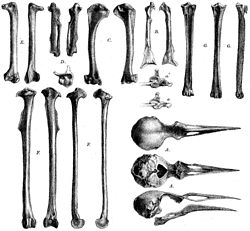Rodrigues starling
| Rodrigues starling | |
|---|---|
 |
|
| The syntype bones as depicted in the 1879 description | |
| Scientific classification | |
| Kingdom: | Animalia |
| Phylum: | Chordata |
| Class: | Aves |
| Order: | Passeriformes |
| Suborder: | Passeri |
| Infraorder: | Passerida |
| Superfamily: | Muscicapoidea |
| Family: | Sturnidae |
| Genus: |
Necropsar Günther & Newton, 1879 |
| Species: | N. rodericanus |
| Binomial name | |
|
Necropsar rodericanus Günther & Newton, 1879 |
|
| Location of Rodrigues | |
| Synonyms | |
The Rodrigues starling (Necropsar rodericanus) is an extinct species of starling that was endemic to the Mascarene island of Rodrigues. Its closest relatives were the Mauritius starling and the hoopoe starling from nearby islands; all three appear to be of Southeast Asian origin. The bird was only reported by French sailor Julien Tafforet, who was marooned on the island from 1725 to 1726. Tafforet observed it on the offshore islet of Île Gombrani. Subfossil remains found on the mainland were described in 1879, and were suggested to belong to the bird mentioned by Tafforet. There was much confusion about the bird and its taxonomic relations throughout the 20th century.
The Rodrigues starling was 25–30 centimetres (10–12 inches) long, and had a stout beak. It was described as having a white body, partially black wings and tail, and a yellow bill and legs. Little is known about its behaviour. Its diet included eggs and dead tortoises, which it processed with its strong bill. Predation by rats introduced to the area was probably responsible for the bird's extinction some time in the 18th century. It first became extinct on mainland Rodrigues, then on Île Gombrani, its last refuge.
In 1725, the French sailor Julien Tafforet was marooned on the Mascarene island of Rodrigues for nine months, and his report of his time there was later published as Relation d'île Rodrigue. In the report, he described encounters with various indigenous species, including a white and black bird which fed on eggs and dead tortoises. He stated that it was confined to the offshore islet of Île Gombrani, which was then called au Mât. François Leguat, a Frenchman who was also marooned on Rodrigues from 1691 to 1693 and had written about several species there (his account was published in 1708), did not have a boat, and therefore could not explore the various islets as Tafforet did. No people who later traveled to the island mentioned the bird. In an article written in 1875, the British ornithologist Alfred Newton attempted to identify the bird from Tafforet's description, and hypothesised that it was related to the extinct hoopoe starling (Fregilupus varius), which formerly inhabited nearby Réunion.
...
Wikipedia

